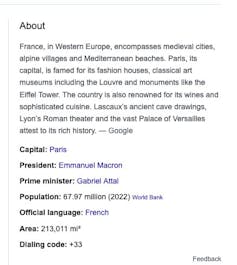If you have used Google lately and been lucky – or unlucky – enough to encounter an answer to your query rather than a bunch of links, you have been subjected to something called AI Overviews. This is a new core feature that Google has been rolling out, a move widely anticipated since the company’s experiments with its LaMDA large language model in 2021, and since OpenAI’s ChatGPT artificial intelligence chatbot rocketed to prominence in 2023.

Google’s knowledge panels summarize information from search results, in contrast to AI Overview, which generates answers based on its training data.
Screen capture by The Conversation, CC BY-ND
This feature is yet another addition to the increasing number of add-ons and tools being integrated into search engines like Google. Some of the notable examples include knowledge graph-driven knowledge panels, which are used to populate relevant factual information in an infobox next to search results, and featured snippets, which are blurbs excerpted from a search result and provided before the link to that page.
But what’s different about AI Overviews is that they are not simply extracted from relevant sources but generated behind the scenes by Google’s generative AI technology. The company’s goal is to give you a personalized, on-demand answer instead of a standard set of documents or even an answer box matching your query.
This seems almost magical and potentially useful in many situations. After all, people use search engines primarily to find answers and not lists of documents. But there’s more to the picture.
My colleague Emily Bender and I have written about what search engine users need, want and have. We have shown that they want not only information but also the ability to discover, learn and question what they find. In other words, users have a wide range of situations and objectives, and compressing them down to a set of links or, worse, a single answer is problematic.
Bad advice
These AI features vacuum up information from the internet and other available sources and spit out an answer based on how they are trained to associate words. A core argument against them is that they mostly remove from the equation the user’s judgment, agency and opportunity to learn.
This may be OK for many searches. Want a description of how inflation has affected grocery prices in the past five years, or a summary of what the European Union AI Act includes? AI Overviews can be a good way to cut through a lot of documents and extract those specific answers.
But people’s searching needs don’t end with factual information. They look for ideas, opinions and advice. Looking for suggestions about how to keep the cheese from sliding off your pizza? Google will tell you that you should add some glue to the sauce. Or wondering if running with scissors has any health benefits? Sure, Google will say, “it can also improve your pores and give you…



